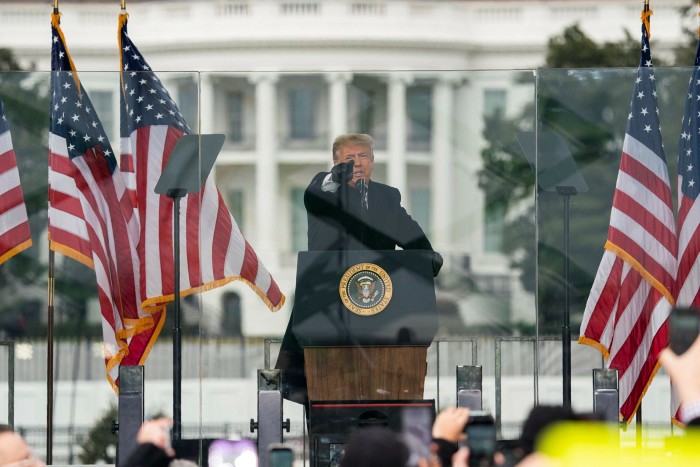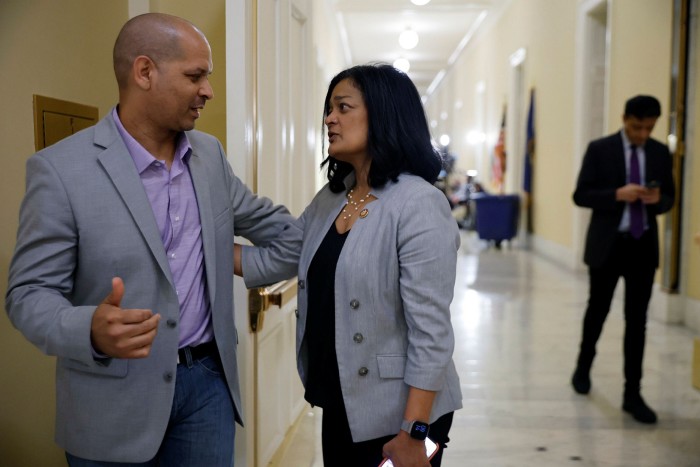[ad_1]
Liz Cheney decided it was time to speak directly to Donald Trump’s supporters this week. Concluding her remarks at the fifth public hearing of the Congressional committee to investigate the attack on the US Capitol last year, the Wyoming Republican and daughter of a former vice-president did not mince her words.
“It can be difficult to accept that President Trump abused your trust — that he deceived you,” said Cheney, who serves as vice-chair of the January 6 committee. “Many will invent excuses to ignore that fact. But that is a fact. I wish it weren’t true, but it is.”
Cheney’s call on millions of Trump supporters to come to terms with his attempt to cling to power in the aftermath of the 2020 elections marked just one moment of high drama in the most damaging set of hearings on the actions of a president and his aides since the Watergate scandal engulfed Richard Nixon 50 years ago.
Her words reflected the bipartisan panel’s confidence that its findings will carry a stronger punch than some had expected. Through the testimony of former officials in Trump’s administration, as well as his political allies and even family members including his daughter Ivanka and son-in-law Jared Kushner, it is becoming clear just how close the former president came to engineering a coup and overturning the results of the election.
“A lot of the pieces are coming together: this was a multi-faceted plan that Donald Trump himself was directing,” says Barbara Comstock, a former Republican congresswoman from Virginia and senior adviser at Baker Donelson in Washington. “The real lawyers at his campaign, at the justice department and at the White House had told him this was ‘BS’ and they weren’t going to be involved. So there was nobody left to do it but him.”

The televised hearings have been so compelling that attorney-general Merrick Garland is under increased pressure to prosecute Trump — a step that would carry big political and legal implications.
Even if that does not happen, the proceedings, which will continue into July, may well damage Trump’s political prospects as he weighs a campaign to take back the White House in 2024. The investigation has highlighted his willingness to subvert America’s democratic institutions for his own gain at a time when Republican voters may be more interested in matters that affect them personally, such as high inflation and crime.
“I think it has just reminded people of how bad it was, and it re-emphasised how backward looking he is,” says Rich Lowry, editor in chief of the conservative magazine National Review. “I don’t know how much the needle has moved, but I think it has moved.”
‘An element of theatre’
The stagecraft of the committee hearings, which take place at the Cannon House Office building just across Independence Avenue from the Capitol, has been central to their impact. Several people who have worked with the committee told the Financial Times that many of the key presentational decisions, such as splitting the hearings by topic, making them brief by Congressional standards and allowing one member to take the lead each time, were made early on — and mainly driven by Cheney.
But the panel also hired James Goldston, the British-American former head of ABC News, as an adviser to help produce the live television broadcasts. Goldston’s appointment, along with a team of mainly ex-ABC News producers, has attracted criticism from conservatives, who say the panel is more interested in conducting a show trial than sifting diligently through the evidence.

According to people who have worked with the committee, Goldston and his team of six producers focused on how each piece of evidence should be shown, including deciding which witnesses should have their pre-recorded testimonies shown on camera and who should be brought back to testify on live TV. When the narrative became complex, the production team created mini documentaries, using the investigators as narrators. When the live footage was particularly powerful, they simply let the tape roll.
At the first hearing, which was shown live at primetime by every major news network except Fox News, the committee played an 11-minute video piecing together the riot as it unfolded, intercut with footage of Trump making a speech in support of the protesters and lawmakers inside the Capitol. As it came to an end, two Democratic members of Congress in the audience, Pramila Jayapal and Cori Bush, wiped away tears.
“Any trial is going to have an element of theatre,” says Elie Honig, a former federal prosecutor who analyses legal issues on CNN. “But what the committee has done really well is stay concise and on topic. Members of Congress have a tendency to bloviate, but they have made sure to let the witnesses and the videotape tell their story as much as possible.”

That hearing attracted an audience of about 20mn, about half of the viewership of Biden’s last State of the Union speech. But through YouTube videos, tweets and even TikTok the message seems to be getting through to the broader American public. An ABC News poll last week found that 58 per cent of Americans now think that Trump should be prosecuted over his role in the attack — up from 52 per cent in late April, before the hearings began.
“These are the Watergate hearings, but for a streaming era,” says Norm Eisen, a former US ambassador who advised the committee that conducted Trump’s first impeachment. Eisen says the January 6 committee has succeeded where previous proceedings have failed in its adept use of mixed media.
Not everyone agrees. Republican pollster Frank Luntz thinks the committee might have had more success persuading Republicans to turn away from Trump had it used a different tactic: “If I’m a Trump person, and all that I’m seeing is the negativity, then my reaction is, ‘Well this is just one side of the story,’” he says.
The Georgians who followed the law

The ELECTION OFFICIAL
Brad Raffensperger
As Georgia’s secretary of state, it fell to Raffensperger to oversee the state’s election. Trump spent over an hour trying to persuade Raffensperger to “find 11,780 votes” in the state after he lost there. But Raffensperger held firm and has since been the target of frequent Trump attacks.
The POLL WORKER
Shaye Moss
Moss fought back tears as she described how she and her mother, both election workers in Georgia, had become the targets of right-wing conspiracy theories. The two were singled out by Trump and his lawyer Rudy Giuliani, who claimed falsely they had brought in suitcases of fraudulent votes for Biden.
A ‘very dangerous precedent’
The big question now is whether Garland will move to prosecute Trump or his aides. Speaking on the anniversary of the attacks, the US attorney-general said the riots had set off “one of the largest, most complex, and most resource-intensive investigations” in the justice department’s history.
The agency, he said, had issued more than 5,000 subpoenas and search warrants, seized approximately 2,000 devices and examined more than 20,000 hours of video footage. “Those involved must be held accountable, and there is no higher priority for us at the Department of Justice,” he said.
Yet it is still unclear whether Garland will launch the most high-profile and consequential prosecution to date: that against Trump. To charge a former president would be an “extraordinarily difficult decision . . . even if we weren’t in the intensely polarised environment we’re in and even if Trump wasn’t such an incredibly divisive figure”, says Andrew Kent, professor at Fordham University’s law school.
The Trump loyalists

The Trump chief of staff
Mark Meadows
Trump’s chief of staff in the final months of the administration was central to his efforts to overturn the election. Meadows refused to co-operate with the January 6 investigation, but the justice department decided not to prosecute him for contempt of Congress.
THE LAWYER
John Eastman
The constitutional scholar persuaded Trump of his theory that the vice-president could refuse to certify the results of the election. Eastman is said to have admitted to colleagues, however, that his theory would not survive a Supreme Court challenge.
Such a move could leave Garland open to criticism that the department has lost its independence and is being used as a political tool. Barbara McQuade, professor at University of Michigan’s law school and a former US attorney, says it could also generate a “very dangerous precedent . . . [whereby] every administration is criminally charging [its] predecessor”.
Yet, she says, if the evidence shows Trump sought to retain power and undermine elections he must be held accountable to prevent such an event happening again. The “deterrence factor is extremely important here . . . Garland’s task is to decide whether criminal prosecution could save democracy without destroying it,” she says.
Some argue the evidence presented so far might be enough to prosecute. For example, McQuade says, potential crimes include revelations that the former president put pressure on Brad Raffensperger, the Georgia secretary of state, to find more votes; on Rusty Bowers, Republican speaker of the Arizona House of Representatives, to convene the legislature to probe election fraud allegations; and on former vice-president Mike Pence to reject results from states Biden had won.
Others suggest Trump could face criminal charges, including conspiring to defraud the US or obstructing an official proceeding (in this case, the certification by Congress of the election results). But the DoJ must prove criminal intent “beyond reasonable doubt”. This is a challenging bar to meet as it means proving Trump knew he was breaking the law.

Trump’s lawyers could attempt to quash accusations of criminality by arguing he was not of sound mind or was suffering from conditions such as narcissistic personality disorder. But Kent says he would be surprised if the former president were to agree to such a strategy: “That would be a huge blow to his ego.”
From his base at Mar-a-Lago in Florida, the former president seems a little rattled. While he labelled the Congressional inquiry a “kangaroo court” this month, he has also slammed Kevin McCarthy, the top Republican in the House, for deciding Trump-friendly lawmakers should not sit on the committee, thus allowing his opponents to shape its direction.
There are suggestions that Trump’s popularity might be dented among some Republican voters. A poll in New Hampshire, a key battleground state, asking respondents to pick a Republican presidential candidate for 2024 found Trump slightly trailing Ron DeSantis in June — despite having held a strong lead over the Florida governor when the same question was asked last October.

“If you’re not into Trump, that’s the most encouraging Republican poll since, I don’t know . . . probably in 2016,” says Lowry.
Trump remains the party’s heavyweight in terms of fundraising and in national polls. Many of his preferred candidates have prevailed in Republican primary contests ahead of the midterm elections, and his conspiracy theories live on among Republican-elected officials and within the conservative base.
Yet even if Trumpism lives on, the man himself appears more assailable now than before the hearings started, Lowry suggests: “I can’t quantify it. I can’t prove it. But I think there’s been a little shift going on at least.”
[ad_2]
Source link

